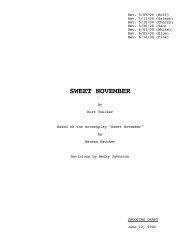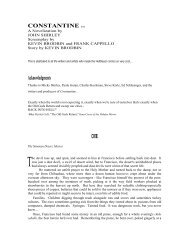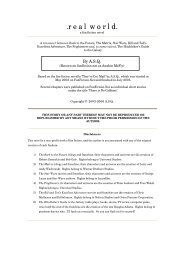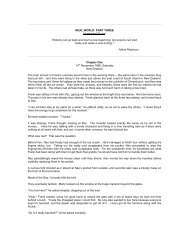Queer Keanu: Race, Sexuality and the Politics of - Whoa is (Not) Me
Queer Keanu: Race, Sexuality and the Politics of - Whoa is (Not) Me
Queer Keanu: Race, Sexuality and the Politics of - Whoa is (Not) Me
You also want an ePaper? Increase the reach of your titles
YUMPU automatically turns print PDFs into web optimized ePapers that Google loves.
on racial identity” (8). If we can’t define whiteness as common sense <strong>the</strong>n <strong>the</strong> power<br />
dynamic that supports <strong>and</strong> creates racial difference <strong>is</strong> laid bare. Society dem<strong>and</strong>s a legible<br />
racial body in order to justify its inequalities.<br />
The public image <strong>of</strong> Reeves, however, violates th<strong>is</strong> opposition <strong>of</strong> racial <strong>and</strong><br />
sexual passing. Butler has argued that passing relies on a constant <strong>and</strong> repeated d<strong>is</strong>avowal<br />
(Bodies, 171), but while Reeves <strong>of</strong>ten fails to affirm h<strong>is</strong> racial difference, he does, in fact,<br />
declare himself as racially marked through h<strong>is</strong> name. Nor has he attempted to obscure h<strong>is</strong><br />
racial background, leading to <strong>the</strong> “revelation” <strong>of</strong> h<strong>is</strong> race a la Mariah Carey or <strong>Me</strong>g <strong>and</strong><br />
Jennifer Tilly. Yet, he <strong>is</strong> continually read as racially unmarked. While all passing <strong>is</strong> a<br />
collusion between <strong>the</strong> individual <strong>and</strong> <strong>the</strong> larger social order, Reeves, once again, appears<br />
to be <strong>the</strong> object ra<strong>the</strong>r than <strong>the</strong> subject <strong>of</strong> a racialized identity. Ra<strong>the</strong>r than being urged to<br />
come out, a form <strong>of</strong> willful forgetting keeps pushing Reeves back into <strong>the</strong> racial closet.<br />
Thus, <strong>the</strong> language <strong>of</strong> closeting <strong>and</strong> outing, <strong>the</strong> language <strong>of</strong> queer identity, can be<br />
employed to speak about Reeves when <strong>the</strong> language <strong>of</strong> conventional racial analys<strong>is</strong> fails.<br />
The case <strong>of</strong> <strong>Keanu</strong> Reeves forces a reconsideration <strong>of</strong> <strong>the</strong> meaning <strong>of</strong> racial<br />
passing as well as what one might call racial outing. One major way that Reeves, as an<br />
object <strong>of</strong> critical analys<strong>is</strong>, differs from <strong>the</strong> majority <strong>of</strong> examples <strong>of</strong> racial passing <strong>is</strong> <strong>the</strong><br />
fact that h<strong>is</strong> passing takes place in <strong>the</strong> postCivil Rights era. How do we speak about<br />
passing when <strong>the</strong> end <strong>of</strong> <strong>of</strong>ficial, legal racial segregation makes passing less legible <strong>and</strong><br />
less defined? Even though segregation <strong>and</strong> d<strong>is</strong>crimination are still everyday occurrences













